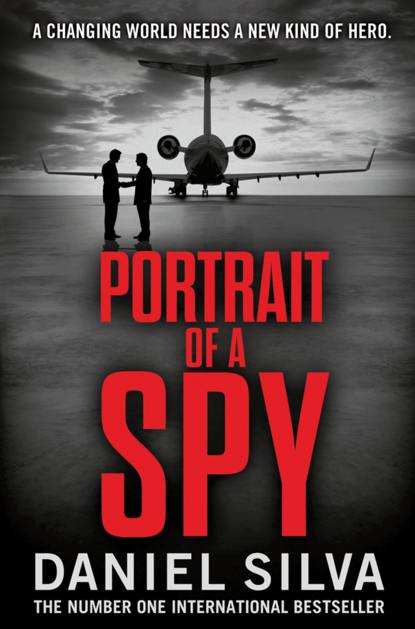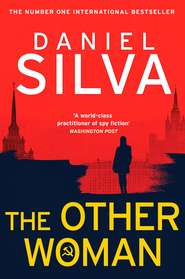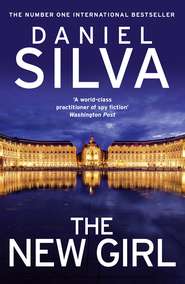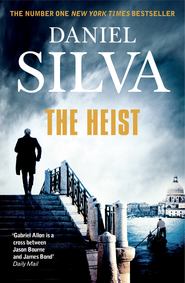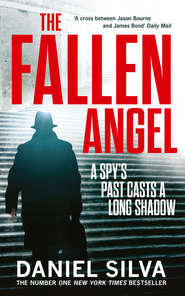По всем вопросам обращайтесь на: info@litportal.ru
(©) 2003-2024.
✖
Portrait of a Spy
Настройки чтения
Размер шрифта
Высота строк
Поля
“They’re the best in Cornwall. So is the clotted cream.”
Navot made no movement. Gabriel gave a perceptive smile.
“How much more weight does Bella want you to lose?”
“Five pounds. Then I get to go on maintenance,” Navot added gloomily, as though it were a prison sentence. “What I wouldn’t give for your metabolism. You’re married to one of the world’s greatest cooks, but you still have the body of a twenty-five-year-old. Me? I’m married to one of the country’s foremost experts on Syria, and if I even smell a pastry, I have to let my trousers out.”
“Maybe it’s time you told Bella to lighten up on the dietary restrictions.”
“You tell her,” Navot said. “All those years studying the Baathists in Damascus have left a mark on her. Sometimes I feel as though I’m living in a police state.”
They were seated at an isolated table near the rain-spattered windows. Gabriel was facing the interior; Navot, the sea. He was wearing a pair of corduroy trousers and a beige sweater that still smelled of the men’s department at Harrods. He placed his cap on an adjacent chair and ran a hand over his cropped strawberry-blond hair. It had a bit more gray in it than Gabriel remembered, but that was understandable. Uzi Navot was now the chief of Israel’s secret intelligence service. Gray hair was one of the many fringe benefits of the job.
Were Navot’s brief tenure to end now, it would almost certainly be regarded as among the most successful directorships in the long and storied history of the Office. The accolades that had been bestowed upon him were the result of Operation Masterpiece, the joint Anglo-American-Israeli undertaking that had resulted in the destruction of four secret Iranian nuclear facilities. Much of the credit rightly belonged to Gabriel, though Navot preferred not to dwell on that aspect of the affair. He had been awarded the job as chief only because Gabriel had repeatedly turned it down. And the four enrichment facilities would still be spinning away if Gabriel hadn’t identified and recruited the Swiss businessman who was covertly selling component parts to the Iranians.
For the moment, however, Navot’s thoughts seemed focused only on the plate of scones. Unable to resist any longer, he selected one, split it with great care, and smothered it with strawberry preserves and a dollop of the clotted cream. Gabriel poured himself a cup of tea from an aluminum pot and quietly asked about the purpose of Navot’s unannounced visit. He did so in fluent German, which he spoke with the Berlin accent of his mother. It was one of five languages he and Navot had in common.
“I had a number of housekeeping issues to discuss with my British counterparts. Included on the agenda was a somewhat perplexing report about one of our former agents who’s now living in retirement here under MI5 protection. There was a wild rumor going around about this agent and the bombing in Covent Garden. To be honest, I was a bit dubious when I heard it. Knowing this agent well, I couldn’t imagine that he would endanger his position in Britain by doing something so foolish as drawing his weapon in public.”
“What should I have done, Uzi?”
“You should have called your MI5 minder and washed your hands of it.”
“And if you had found yourself in a similar position?”
“If I were in Jerusalem or Tel Aviv, I wouldn’t have hesitated to put the bastard down. But here . . .” Navot’s voice trailed off. “I suppose I would have considered the potential consequences of my actions first.”
“Eighteen people died, Uzi.”
“Consider yourself lucky the death toll wasn’t nineteen.” Navot removed his spindly eyeglasses, something he often did before embarking on an unpleasant conversation. “I’m tempted to ask whether you actually intended to take the shot. But given your training and your past exploits, I’m afraid I know the answer. An Office agent draws his weapon in the field for one reason and one reason only. He doesn’t wave it around like a gangster or make idle threats. He pulls the trigger and shoots to kill.” Navot paused, then added, “Do unto others before they have a chance to do unto you. I believe those words can be found on page twelve of Shamron’s little red book.”
“He knows about Covent Garden?”
“You know better than to ask a question like that. Shamron knows everything. In fact, I wouldn’t be surprised if he heard about your little adventure before I did. Despite my attempts to ease him into permanent retirement, he insists on staying in contact with his sources from the old days.”
Gabriel added a few drops of milk to his tea and stirred it slowly. Shamron . . . The name was nearly synonymous with the history of Israel and its intelligence services. After fighting in the war that led to Israel’s reconstitution, Ari Shamron had spent the subsequent sixty years protecting the country from a host of enemies bent on its destruction. He had penetrated the courts of kings, stolen the secrets of tyrants, and killed countless foes, sometimes with his own hands, sometimes with the hands of men such as Gabriel. Only one secret had eluded Shamron—the secret of contentment. Aged now and in dreadful health, he clung desperately to his role as the éminence grise of Israel’s security establishment and still meddled in the internal affairs of the Office as though it were his private fiefdom. It was not arrogance that drove Shamron but a nagging fear that his entire life’s work had been in vain. Though economically prosperous and militarily strong, Israel remained surrounded by a world that was, for the most part, hostile to its very existence. The fact that Gabriel had chosen to reside in this world was among Shamron’s greatest disappointments.
“I’m surprised he didn’t come here himself,” Gabriel said.
“He was tempted.”
“Why didn’t he?”
“It’s not so easy for him to travel.”
“What’s wrong now?”
“Everything,” Navot said, shrugging his heavy shoulders. “He rarely leaves Tiberias these days. He just sits on his terrace staring out at the lake. He’s driving Gilah to distraction. She’s been begging me to give him something to do.”
“Should I go see him?”
“He’s not on his deathbed, if that’s what you’re implying. But you should pay a visit sometime soon. Who knows? You might actually decide that you like your country again.”
“I love my country, Uzi.”
“Just not enough to live there.”
“You always did remind me a bit of Shamron,” Gabriel said with a frown, “but now the resemblance is uncanny.”
“Gilah told me the same thing not long ago.”
“I didn’t mean it as a compliment.”
“Neither did she.” Navot added another spoonful of clotted cream to his scone with exaggerated care.
“So why are you here, Uzi?”
“I want to present you with a unique opportunity.”
“You sound like a salesman.”
“I’m a spy,” Navot said. “There’s not much of a difference.”
“What are you offering?”
“A chance to atone for a mistake.”
“What mistake was that?”
“You should have shot Farid Khan through the back of the head before he hit his detonator switch.” Navot lowered his voice and added confidingly, “That’s what I would have done, if I’d been in your shoes.”
“And how might I make amends for this lapse in judgment?”
“By accepting an invitation.”
“From whom?”
Navot gazed silently westward.
“The Americans?” asked Gabriel.
Navot smiled. “More tea?”
The rain ceased as abruptly as it began. Gabriel left money on the table and led Navot down the steep footpath to Polpeor Cove. The bodyguard was still leaning against the crumbled lifeboat ramp. He watched with feigned indifference as Gabriel and Navot made their way slowly across the rocky beach to the water’s edge. Navot cast a distracted glance at his stainless steel wristwatch and turned up his coat collar against the gusty wind rising from the sea. Gabriel was once again struck by the uncanny resemblance to Shamron. The likeness went beyond the superficial. It was as if Shamron, by the sheer force of his indomitable will, had somehow managed to take possession of Navot, body and soul. It was not the Shamron who had been weakened by age and infirmity, thought Gabriel, but Shamron in his prime. All that was missing were the wretched Turkish cigarettes that had ravaged Shamron’s health. Bella had never permitted Navot to smoke, not even for the sake of his cover.
“Who’s behind the bombings, Uzi?”
“Thus far, we’ve been unable to make a firm attribution. The Americans, however, seem to think he’s the future face of global jihadist terror—the new Bin Laden.”





